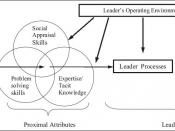Relevance of different perspectives on leadership for business today As economy has transformed from industrial-based to information-based, traditional perspectives on leadership may not be appropriate. This paper distinguishes four dominant perspectives on leadership in the twentieth century and discusses critically their relevance or irrelevance for business today.
I. Trait approach Early leadership theories attempted to explain leadership by internal qualities with which a person is born (Bernard, 1926). Traits approach is established on the idea that leaders are born, not made. The key to success is basically in identifying those people who were born to be great leaders (Horner, 1997). Types of traits examined by various researchers included physical characteristics, personality characteristics, social characteristics, and personal abilities and skills (House and Podsakoff, 1994).
Trait approach has the greatest potential application in selecting and developing managers. Appraisal on personality traits together with information about someone's prior experience and performance can be used to predict their likely success in a senior managerial position.
Human resource planning and training is more effective when matching the skill requirements for each position with the skills of current employees.
Nevertheless, findings from research yet cannot prove it very useful. Although it showed that traits might help to distinguish leaders from non-leaders in terms of subordinates, it failed to distinguish effective and from ineffective leaders (House and Podsakoff, 1994). Further, this approach assumes a leader to have relatively stable characteristics all the time but ignores the impact of situational and environment factors in leader's effectiveness.
II. Behavioural approach: Task vs. People perspective The criticism of traits approach moves the focus on "what successful leaders do"�, not how they look to others (Halpin and Winner, 1957). A major objective of behavioural approach is to identify effective leadership behaviour and how effective leaders differ in behaviour from ineffective ones.


